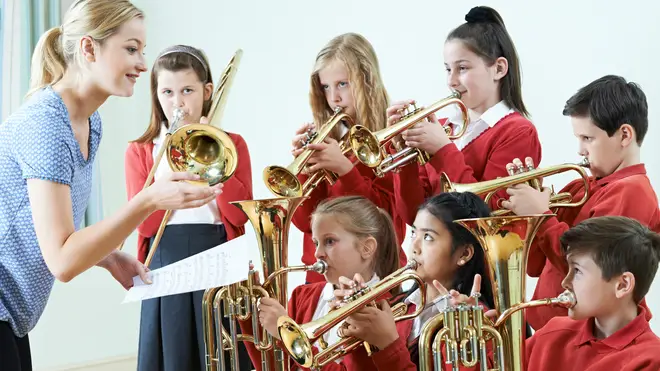Government says ‘no singing, wind or brass playing’ for older pupils in school choir or assembly
2 July 2020, 13:04 | Updated: 3 July 2020, 11:35

The government has warned against singing, wind or brass playing in large ensembles for some year groups going back to schools in September, in a bid to control the spread of coronavirus.
In the government’s back-to-school plan for September, schools in England have been recommended to bar older pupils, who are more susceptible to coronavirus, from ‘singing, wind or brass playing’ in large groups.
In a section of the plan labelled ‘Specific points for Key Stages 4 and 5’ (Years 10 to 13), it says: “Schools should note that there may be an additional risk of infection in environments where you or others are singing, chanting, playing wind or brass instruments or shouting.”
It adds that schools should encourage “physical distancing and playing outside wherever possible” as well as “limiting group sizes to no more than 15, positioning pupils back-to-back or side-to-side, avoiding sharing of instruments, and ensuring good ventilation”.
“Singing, wind and brass playing should not take place in larger groups such as school choirs and ensembles, or school assemblies,” the advice concludes.
The plan does not confirm for how long the measures will be in place.
Read more: New wedding guidance says ‘no singing, no wind instruments’ >

Education Secretary Gavin Williamson says schools will return in September
The new guidelines come as part of the government’s official approach to re-opening schools in full, released today (2 July). It includes details of its £1 billion catch-up plan, since schools were closed in March under coronavirus lockdown.
Current restrictions on group sizes, which deem any gatherings over 30 people illegal from 4 July, will be lifted to allow schools, colleges and nurseries to fully reopen for children and young people.
According to advice the government received from scientists, children are at extremely low risk of falling ill from the virus. In the UK, 0.01 percent of deaths have been people under 15.

From September, schools will keep children in class or year group-sized “bubbles” and encourage older pupils to keep a distance from each other and staff. Protective measures such as regular cleaning and hand-washing will continue to be encouraged.
When there is a positive case in a school, small groups of pupils and staff could be asked to self-isolate for up to 14 days as a precaution. If an outbreak at a school is confirmed, a mobile testing unit may be sent to test others who may have been in contact with the person who has tested positive.

Monti's Czárdás, played by The Kanneh-Masons
A recent leaked draft of the guidelines suggested ‘non-core’ subjects would be dropped in the first term to allow time for catch-up in English and maths, for non-GCSE and A-Level pupils.
The final document states that only “in exceptional circumstances, it may be in the best interests of a year 11 pupil to discontinue an examined subject because the school judges that they would achieve significantly better in their remaining subjects as a result, especially in GCSE English and mathematics.”
It adds, “Prioritisation within subjects of the most important components for progression is likely to be more effective than removing subjects, which pupils may struggle to pick up again later”, but does not clarify which subjects might have the most important components for progression.
The aim, the document concludes, is “to return to the school’s normal curriculum in all subjects by summer term 2021”.
Integral to the announcement is new guidance around social distancing released at the same time, and the Incorporated Society of Musicians has followed up with a letter to the Department for Culture, Media and Sport, and the Department for Business Energy and Industrial Strategy, seeking clarity on how it will impact music teachers.


































